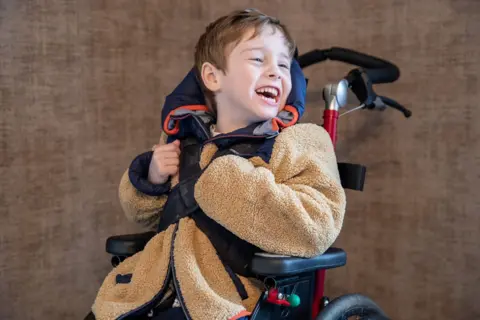By Jane Deith and Alys Harte, BBC File on 4
 Alex Smith
Alex SmithThe number of children receiving treatment in private hospitals across the UK rose by almost a quarter last year to more than 46,000, according to new data seen by the BBC.
In each case, families either paid for treatment or used medical insurance – rather than being referred by the NHS.
The record figures from private healthcare providers come as England’s NHS trusts tell File on 4 that children have become the “forgotten generation” in the race to reduce health service backlogs.
The Department of Health says NHS staff are “working tirelessly” to cut waiting lists.
But the Royal College of Surgeons of England told us children were lagging behind adults and spending years waiting for NHS surgery – with potentially life-long consequences for their health and development.
NHS Providers, which represents trusts, says some hospitals can find it easier to do large numbers of adult operations because they are often simpler and quicker to perform.
‘A cloud over my head’
The BBC has spoken to a number of families whose children’s conditions have deteriorated during long waits.
They include 16-year-old Georgina Smith from Hertfordshire, who is waiting for open-heart surgery to repair a valve on her right side which doesn’t close properly. It can cause her blood to flow the wrong way, making it harder for her heart to work.
Georgina is one of 601 children waiting for heart surgery in England – 139 have been waiting more than six months.
She suffers chest pains, extreme fatigue and fainting episodes and has been forced to miss a lot of school.
Ten years ago, Georgina’s parents were told she needed surgery immediately. But then doctors at Great Ormond Street Hospital for Children said it would be better to wait until her heart was fully grown.
However, last year an ultrasound showed Georgina’s heart was getting weaker. Doctors said she should have surgery within six months. But Georgina has been on the waiting list for nine months.
Georgina says she feels like her operation will never happen. “It’s like a cloud over my head, it’s always just this waiting and waiting and waiting,” she says.
In a statement, Great Ormond Street Hospital told the BBC: “While we have reduced our cardiac surgery waiting list by 25% since the pandemic, there are many challenges we continue to face”. It added this included demand for beds, often from emergency patients.
After the BBC approached the hospital for a statement, Georgina received a date for surgery in July.

Jane Deith investigates children waiting years for surgery on the NHS
Listen on BBC Sounds now. It will also be on Radio 4 at 20:00 on Tuesday 18 June and 11:00 on Wednesday 19 June.

Data released under a Freedom of Information request reveals the number of children facing very long waits to be admitted to hospital across the UK.
It shows at least 20,000 waits of more than a year for treatment including surgery.
Most of these long waits are in England – approaching 16,000 at the start of this month, up 15% in a year.
Before the pandemic, it was extremely rare for children to wait more than a year for surgery.
Trusts in England say children must be explicitly prioritised by the government, including more funding to allow trusts to commission more surgery.
NHS England, which runs the health service in England, said it recognised it could be distressing for families who were waiting for a child to have surgery. It said it was increasing the number of ring-fenced beds for paediatric surgery, in addition to critical care beds.
The Department of Health added that NHS England had set up a task force specifically aimed at bringing down waiting times for children’s surgery.
In Wales, the Department of Health told us it was putting more money into the NHS and prioritising reducing long waits for children.
Scotland’s Department of Health said it was maximising productivity and targeting extra resources at driving down waiting times for children – particularly the longest waits.
Overall, across the UK, the number of children being seen privately since 2019, before the pandemic, is up 38%.
The figures, from the Private Healthcare Information Network, do not include NHS trusts using private hospitals to provide treatment.
They show the number of children having surgery privately rose almost a fifth last year to over 24,000.
Children aged 15 to 17 are the biggest patient group for surgery. The most common procedures are the insertion of grommets in the ears, removal of tonsils and adenoids, and orthopaedic surgery.
‘Coming to harm’
In Northern Ireland, the Royal College of Surgeons has described the waits for children’s surgery as “dire”.
Niall McGonigle, a thoracic surgeon in Belfast, says thousands of children have been waiting four or five years. He says he has sent out “an SOS” to the Northern Ireland Assembly over the severe backlog.
“Children are suffering. We can no longer sit by and allow this to happen because we do know that patients are coming to harm,” the surgeon told the BBC.
“What may have been a relatively straightforward operation turns into a more complex operation which is more difficult for the surgeon, but more importantly, more difficult for the child.”
In extreme cases, very long delays in surgery risk leaving a child inoperable.
Six-year-old Jack Dorrity, from Ballymena, has cerebral palsy and has been waiting for a hip operation since he was three.
Back then, surgeons at the Royal Belfast Hospital for Sick Children said Jack needed an operation immediately on both his hips, to stop his muscles pulling them out of their sockets.
 Aodhan Roberts/Belfast Telegraph
Aodhan Roberts/Belfast TelegraphBut he has been stuck on the waiting list so long that one hip has now dislocated and is growing up towards his waist. Jack’s father, Leon, says the longer his son waits, the more he’s suffering.
“Any time we put our arms under his legs to lift him out of his chair, he’s sore. He winces, he cries. He’s quite upset, so we know it’s causing him pain,” he says.
Because Jack’s hip has come out of its socket, performing surgery will be more difficult, and it would take too long to do both hips at the same time. So Jack now needs two, six-hour operations.
But the hospital has told Jack’s parents it can’t do a six-hour operation because it would mean cancelling too many other patients. Last year the trust cancelled 566 children’s procedures.
Leon has been warned if Jack waits much longer for surgery, it may not be possible to put his hip back in. Instead, surgeons may have to cut off the top of his leg bone completely. Jack would be left more disabled and unable to bear weight on his leg.
“He’s going to have a floppy leg and his hips will be unbalanced, which can lead to scoliosis. But if we missed the hip surgery, are we going to miss the scoliosis surgery?
“I get angry for Jack. They’re failing children and it’s the children with the greatest needs that are being failed.”
Belfast Health and Social Care Trust said in a statement it was under increased and sustained pressure and was very sorry it has not been able to give Jack his surgery. It said it was exploring all possible options to help him.
Northern Ireland’s Department of Health told us it was trying to maximise the existing capacity in paediatric surgery, but it could not add any more capacity with the funding it received in the budget.


